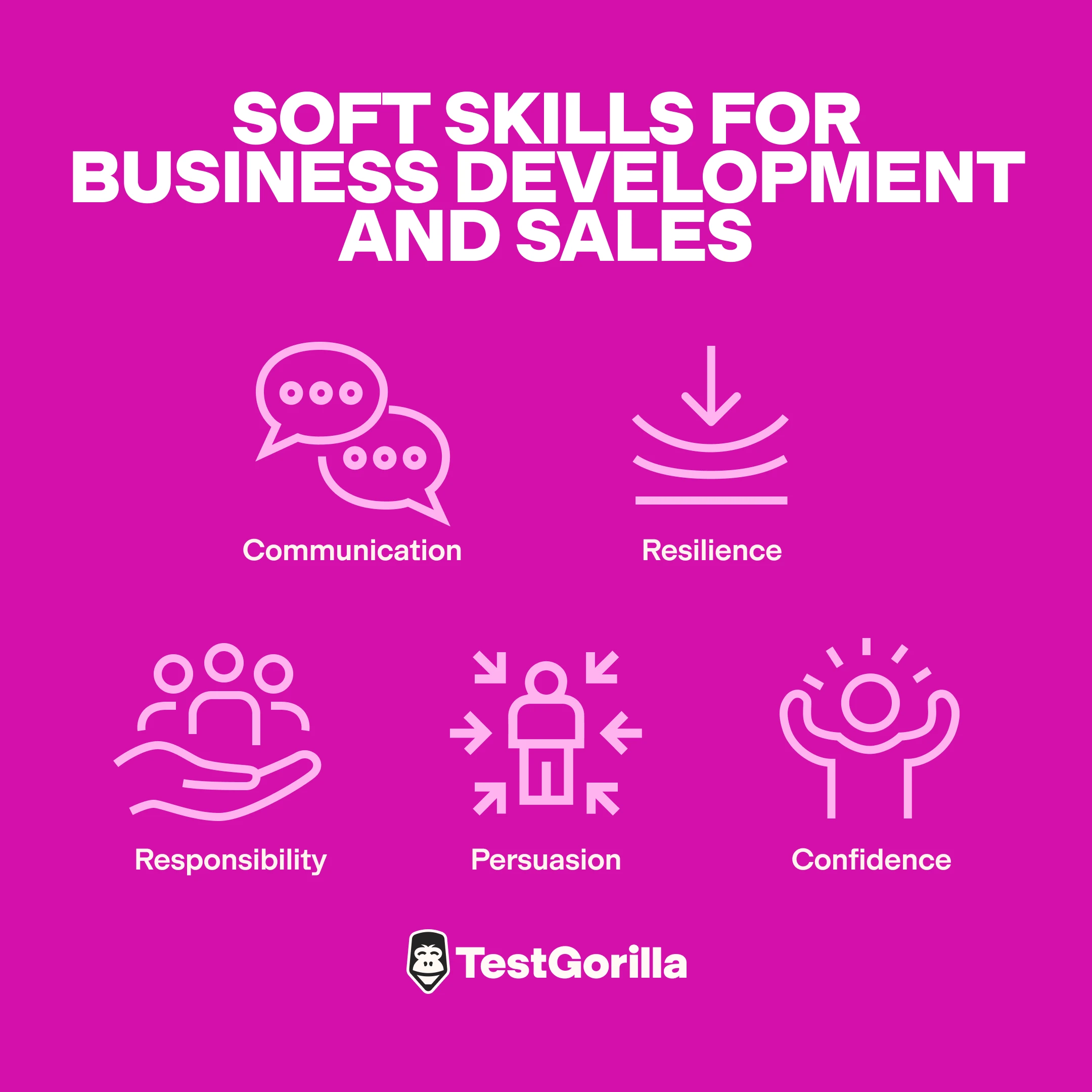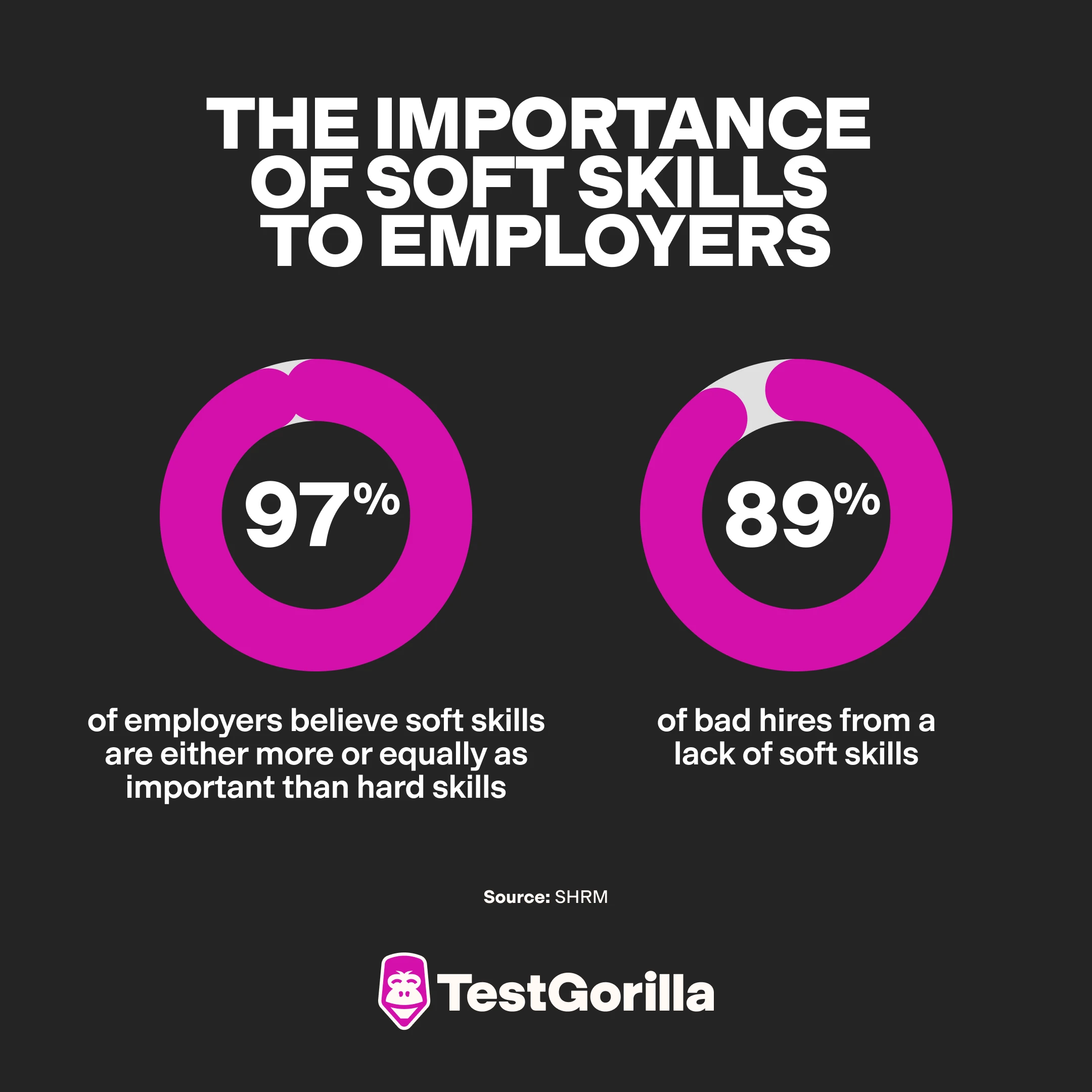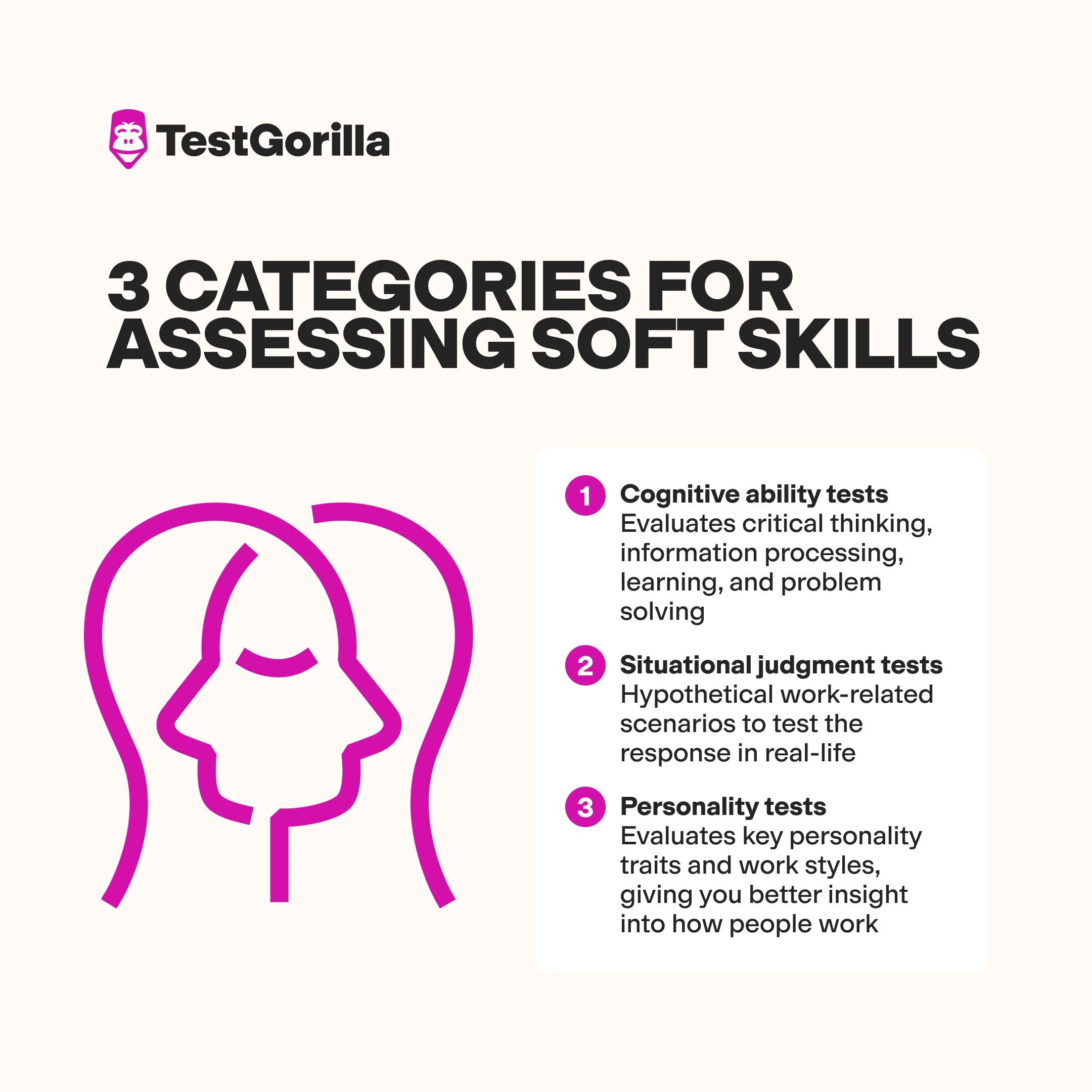Soft skills are attributes and traits that are not job-specific. These are broad, non-technical skills that can be applied to many different roles.
A few examples of soft skills include effective communication, adaptability, teamwork, active listening, and time management.
Soft skills are near-universal in their applicability. An employee with any of these soft skills on top of their hard skills is more effective than an employee with hard skills alone.
This guide contains our lists of the most important soft skills by industry. Most soft skills can be used everywhere, so these lists are far from mutually exclusive.
We also discuss how to assess soft skills at the end of this blog – hiring managers, take note!
Table of contents
An essential list of soft skills that employers look for: 29 traits broken down by industry
Here’s a quick summary of the 29 traits we cover in the sections below:
Communication
Resilience
Responsibility
Persuasion
Confidence
Collaboration
Openness to feedback
Time management
Lifelong learning
Diligence
Ideation
Analysis
Discipline
Empathy
Patience
Organization
Relationship management
Ability to influence
Compassion
Conflict resolution
Inclusiveness
Trustworthiness
Adaptability
Flexibility
Persistence
Pragmatism
Teamwork
Leadership
Self-starter
Now let’s look at each in more detail.
Soft skills for business development and sales
As well as product and policy knowledge, business development and sales roles require strong soft skills to help them with handling objections and building long-term relationships.
List of soft skills for business development and sales:
Communication: Solid verbal communication (and non-verbal communication) helps convey your message and meaning as well as enabling you to understand customer needs and objections
Resilience: Keeping a positive attitude is essential to cope with tough objections and rejections from prospects
Responsibility: Maintaining a strong work ethic helps people stick to goals and attain quota
Persuasion: Social skills like persuasiveness enable you to successfully convey how your service or product can solve the customer’s pain points
Confidence: Displaying self-awareness in your strengths is necessary for showing authority in your service and standing by your claims
Soft skills for creative and digital media
Digital media professionals need technical skills, like proficiency in Adobe Photoshop, but they need the soft skills that enable them to work on teams and manage complex workloads.
List of top soft skills for creative and digital media:
Collaboration: Teamwork skills like collaborating with clients and team members are essential to ensure expectations are met
Openness to feedback: Being able to accept constructive criticism through mentoring or co-workers enables you to acknowledge your weaknesses and improve your skills
Time management: Organizational skills, such as time management skills, are necessary to manage multiple complicated tasks and projects, such as coordinating work with clients and teammates in different time zones
Lifelong learning: This industry moves quickly, so it’s important to keep up with new trends while maintaining the know-how for the most popular tools and software
Soft skills for marketing
Marketers need key hard skills like copywriting and managing data analytics, but they need the support of soft skills that help them create new ideas and understand their target audience.
List of top soft skills for marketing:
Diligence: Employers value workers with specific attention to adhere to brand voice while being thoughtful with content creation and strategy
Ideation: Innovating and creating ideas for clients is essential, so critical thinking skills and problem-solving skills are a must for any marketer
Analysis: Understanding and translating consumer feedback is crucial for providing recommendations for how to take action on it
Soft skills for customer service
Customer success representative skills include hard skills like using customer relationship management (CRM) software and data entry, but they’re heavily reliant on crucial soft skills like understanding customer concerns and problem-solving.
Soft skills list for customer service:
Discipline: Knowing and following company rules is not only necessary for the representative, but it also helps them clearly relay important guidelines to customers
Empathy: Strong emotional intelligence is necessary for understanding customer issues and empathizing with their concerns and distress
Patience: Being able to calmly speak to customers and get the right information out of them is a personal attribute essential for resolving issues
Soft skills for education
Education professionals need hard skills like a thorough understanding of the curriculum and classroom management, but there’s a long soft skills list for success in education, such as managing relationships and organizing their work.
List of top soft skills for education:
Organization: Making sure your belongings and notes are organized is essential when planning lessons, preparing events, and keeping track of schedules
Relationship management: Interpersonal skills are important to maintain relationships with parents, fellow teachers, and students
Ability to influence: Education professionals need to have the nuance to get the attention of students and lead them in the right direction, but on top of that, they also need to influence senior roles to make key decisions
Soft skills for human resources
A soft skills list is a top priority for HR professionals. Yes, they still need hard skills like business management and finance knowledge, but soft skills like compassion and trustworthiness drive human resources.
List of top soft skills for human resources:
Compassion: Open-mindedness is important when interacting with employees and learning about their issues at work
Conflict resolution: Mediating workplace conflict, understanding employee relations, and finding fair solutions is essential for HR
Inclusiveness: The ability to separate emotions, opinions, and biases from your work helps make fair and equitable conflict management decisions
Trustworthiness: Making it known that you have strong dependability is necessary to gain leaders’ and employees’ trusts to adopt new processes and make change
Soft skills for medical professionals
The medicine industry has many required hard skills, like administering treatment and diagnosing patients. It’s also one of the few industries where many roles actually require a college degree or certification.
However, don’t let this distract you from the long list of soft skills that these positions need.
Soft skills list for medical professionals (including veterinarians):
Adaptability: The ability to tailor their disposition and work style to meet patient needs is crucial
Flexibility: Acting on your feet and shifting priorities is essential in an industry with many sudden demands and changes
Persistence: It’s important for medical professionals to be determined to find answers and solutions for patients
Pragmatism: Medical professionals can sometimes find themselves in life-or-death situations, so they must have practical decision-making and prioritization skills to maximize the lives they can save
Soft skills for technology
Technology roles require solid hard skills, such as the programming skills that Java developers rely on.
However, technology roles have many soft skills that drive their work, such as self-motivation and solid teamwork.
List of top soft skills for technology:
Teamwork: The ability to work independently is important, but having the people skills to work closely with others and find complementary skills is essential
Leadership: Engineers need to be open to helping others with their personal development and providing direction, so leadership skills are key for the collective
Self-starter: Self-motivation and the ability to recognize problems and take action are crucial when troubleshooting and coding
Why are soft skills so important?
Soft skills have always driven every industry and job role. Studies time and time again, from today and going all the way back to 1918, have shown that a large amount of career success comes from soft skills.[1]
So why have soft skills gained rapid attention in the modern era? It’s only recently that the importance of soft skills has become common knowledge to HR professionals and job seekers.
One reason is the upward trend of remote work. According to Forbes, flexible work makes soft skills like time management and communication essential.
The rise of skills-based organizations also makes soft skills imperative because these transferable competencies make agile and adaptable job positions much smoother.
Top soft skills are in high demand, and that demand continues to grow. In fact, the need for soft skills is projected to increase by as much as 26% by 2030.
So the big question is: Have soft skills eclipsed hard skills in importance?
The short answer is no. Both types of skills are necessary, they may just have varying levels of importance depending on the role.
For more insights, read our article on hard skills vs. soft skills.
Now, let’s examine why soft skills are important for both job seekers and employers.
For job seekers and employees
As a job candidate, there are many benefits for you to recognize and display your soft skills during the job search.
For job seekers, well-defined, attractive soft skills show recruiters you’re a top candidate, especially due to the rising need for them.
Here’s a quick rundown of why soft skills are important for candidates:
Helps you stand out from the crowd during hiring
Enables you to secure a better job
Facilitates career switching
One survey found that 97% of employers believe that soft skills are either as important or more important than hard skills, and 89% of bad hires fail because of a lack of soft skills.
This makes it imperative to display your soft skills when job hunting.
Employees, on the other hand, equally benefit from identifying their soft skills. It helps boost job performance and define future upskilling opportunities.
Here are a few reasons why soft skills are essential for employees:
They facilitate better collaboration and communication with your team
They increase job satisfaction
They boost job performance and ease of work
They help employees and managers identify career growth opportunities
We should quickly expand on that last point.
Soft skills are one of the easiest ways to transition to a new role, and they’re a clear indicator of potential in certain positions. For example, sales representatives with leadership abilities are good candidates for promotion to a management position.
These skills also help when your career path is atypical and crosses departments. A career path that moves you from the financial side of HR to hiring and recruiting is much easier when you rely on soft skills like trustworthiness and the ability to make sound decisions.
For employers
Understanding and identifying top soft skills is essential to finding the best candidates.
This knowledge helps you determine which skills are necessary for each role and why certain employees are high performers. This also means understanding soft skills helps you write more effective job descriptions.
When you and your candidates understand the key skills and competencies that go into a role, you can make better hires who have accurate expectations.
All of this preparation sets you up for hiring better employees, which in turn enables you to leverage a stronger workforce.
Soft skills can positively impact your company by:
Influencing how teammates collaborate, which impacts projects, customer relations, and company reputation
Impacting employee performance
Improving culture and work environment because people have the right skills for their roles
Reducing mis-hires
Let’s talk about that last point in depth.
Soft skills are essential for every role, so when you don’t accurately acknowledge and assess them, you can end up with bad hires.
You can find the most talented graphic designers in the city, but if they aren’t open to feedback, they won’t be able to work well within your company.
This means that identifying soft skills reduces costs because mis-hires need to be trained and onboarded but end up leaving in the end. The cost of a bad hire can be extremely high – companies lose an average of $14,900 per bad hire.[2]
Further, a bad hire ends up costing more than money. It amounts to lost time, depleted energy, and a resentful team forced to pick up the slack until a replacement comes along.
How to assess soft skills: 2 proven methods
You have a complete list of soft skills, and you’ve heard why they’re important – so how do you find them in a candidate?
Traditional hiring methods are notoriously unsatisfactory for evaluating soft skills. They heavily rely on subjectivity and “gut feelings.”
It’s hard to gauge soft skills from unstructured interviews and impossible to judge them from a resume and cover letters.
For example, a candidate may put in their resume that they “collaborate well,” but you have no way to know if they’re telling the truth. They might also have an inaccurate picture of their own collaboration skills.
You might hire this candidate based on their list of soft skills, only to later discover that they’re a false positive, an unsuitable candidate incorrectly labeled as suitable.
Alternatively, an unstructured interview may put a candidate in a sudden, awkward situation and “prove” to the interviewer that they can’t negotiate, like an unprompted request for the candidate to sell them a pen.
These methods used to be all we had to determine quality, but we have new ways now.
To accurately assess the soft skills of a candidate, you need methods that give real data and aren’t stifled or interrupted by unconscious bias.
Our biggest recommendation for assessing soft skills is to use objective methods based on facts and real results.
Let’s take a close look at the two best methods for assessing soft skills, talent assessments and structured interviews.
Here’s a quick summary:
Method | Description |
1. Use talent assessments to verify soft skills | Gauge candidates with skills tests that determine soft skills through objective data |
2. Evaluate soft skills through structured interviews | Build an interview script that includes key soft skills questions Put candidates through role play scenarios that display their soft skills in real-time |
Use talent assessment tests to verify soft skills
Talent assessment tests are a hiring method that enables you to build unique tests to determine the quality of your candidates.
They can test a variety of skills and competencies, including hard skills, soft skills, and language proficiency.
Skills tests allow for the highest objectivity because they minimize human bias.
Keep in mind that human bias is almost always unintentional and unconscious, but it can be detrimental to choosing the right candidate, which is why it’s incredibly important to avoid bias in hiring.
Talent assessments ensure all candidates are tested across the same parameters and given equal opportunities to demonstrate their skill sets.
So what about soft skills specifically?
We recommend these three categories for assessing soft skills:
Cognitive ability tests: These tests evaluate how a person thinks critically, processes information, learns new things, and solves problems
Situational judgment tests: These tests go over hypothetical work-related scenarios and how the person would respond in real-life
Personality tests: These tests assess key personality traits and work styles, giving you better insight into how people work
Let’s examine the Communication test, which is one of our situational judgment tests.
This test evaluates a candidate’s verbal and written communication skills as well as their listening skills. It involves assessing candidates with written exercises and situational roleplays.
The candidates complete the test, and you receive the results in real-time. You can then shortlist candidates based on their scores to easily identify top applicants.
You can also evaluate hard skills in the same assessment and then view the individual results of each unique test to see where each candidate is strongest.
Talent assessments are not only an objective way to assess soft skills; they’re also fast and affordable. Out of organizations that use skills-based hiring – like talent assessments – 74% reduced cost-per-hire and 82% reduced time-to-hire.
If you’re looking for a comparison of a variety of these tools, check out our guide on the best soft skills assessment tools.
Evaluate soft skills through structured interviews
Structured interviews are job interviews that follow a pre-written script and help you make decisions based on predetermined success criteria.
Traditional job interviews are also known as unstructured interviews and they can rely quite heavily on bias and snap decisions.
Structured interviews enable you to make informed, objective decisions that more accurately evaluate hard and soft skills.
Here’s a quick comparison between the two:
Structured interviews | Unstructured interviews |
- Have a pre-written script - Ask the same questions in the same order for all candidates - Set predetermined success criteria | - Have a vague idea of the type of questions you’ll ask - Ask a variety of questions in different orders - Decide successful candidates based on in-the-moment feelings |
Structured interviews have the ability to gauge soft skills effectively and accurately. They generally fall under two categories, behavioral and situational:
Behavioral interviews: Analyzing a candidate’s past experiences to gauge how they’ve reacted to certain events and used their skill sets
Situational interviews: Questioning the candidate on hypothetical scenarios and how a person would handle daily tasks or difficult situations
Let’s take a look at some example questions for both types of structured interview:
Example question | What it assesses | Question type |
How do you interact with teammates who approach work differently than you? | - Collaboration - Teamwork | Behavioral |
Tell me about a time when your responsibilities changed rapidly. How did you handle it? | - Adaptability - Responsibility | Behavioral |
What would you do if an angry customer confronted you? | - Communication - Empathy | Situational |
How would you respond to harsh feedback on a project you were proud of? | - Openness to feedback - Lifelong Learning | Situational |
You can also pair talent assessments with structured interviews to give you more information on their test results. For example, if they score lower in one skill than others, you can ask about this specific skill for deeper insights.
Another thing to try is adding opportunities for candidates to display soft skills right into the interview:
End the interview by giving the candidate feedback on a few of their responses to test their openness to feedback
Ask questions slowly or repetitively and gauge their reaction to determine their patience
Consider the interview as a whole to evaluate good communication skills
Just be aware that there are limitations to these methods. You don’t want to throw a candidate into a roleplay scenario unprepared.
If you choose to use these methods, try letting the candidate know ahead of time that their interview will be judged not only on their answers but how they gave their answers.
Test top soft skills with talent assessments
Soft skills are crucial for every industry, and they’re only growing in importance each year.
Acknowledging and identifying soft skills is essential for job seekers and employers, whether you’re determining your soft skills to apply for a new role or you’re building a list of soft skills in the workplace to inform hiring efforts.
Once you know the soft skills your position requires, ensure you evaluate it accurately and fairly with talent assessments and structured interviews.
If you’re looking for a deep dive into individual soft skills, read our article on power skills - or check out the top skills employers look for in candidates today.
To start planning your next talent assessment, visit our test library to view essential soft skills tests.
Sources
"The Soft Skills Disconnect". National Soft Skills Association. Retrieved October 26, 2023. https://www.nationalsoftskills.org/the-soft-skills-disconnect/
"Nearly Three in Four Employers Affected by a Bad Hire, According to a Recent CareerBuilder Survey". (December 7, 2017). PR Newswire. Retrieved October 26, 2023. https://www.prnewswire.com/news-releases/nearly-three-in-four-employers-affected-by-a-bad-hire-according-to-a-recent-careerbuilder-survey-300567056.html
Related posts
Hire the best candidates with TestGorilla
Create pre-employment assessments in minutes to screen candidates, save time, and hire the best talent.
Latest posts
The best advice in pre-employment testing, in your inbox.
No spam. Unsubscribe at any time.

Hire the best. No bias. No stress.
Our screening tests identify the best candidates and make your hiring decisions faster, easier, and bias-free.
Free resources
This checklist covers key features you should look for when choosing a skills testing platform
This resource will help you develop an onboarding checklist for new hires.
How to assess your candidates' attention to detail.
Learn how to get human resources certified through HRCI or SHRM.
Learn how you can improve the level of talent at your company.
Learn how CapitalT reduced hiring bias with online skills assessments.
Learn how to make the resume process more efficient and more effective.
Improve your hiring strategy with these 7 critical recruitment metrics.
Learn how Sukhi decreased time spent reviewing resumes by 83%!
Hire more efficiently with these hacks that 99% of recruiters aren't using.
Make a business case for diversity and inclusion initiatives with this data.




















